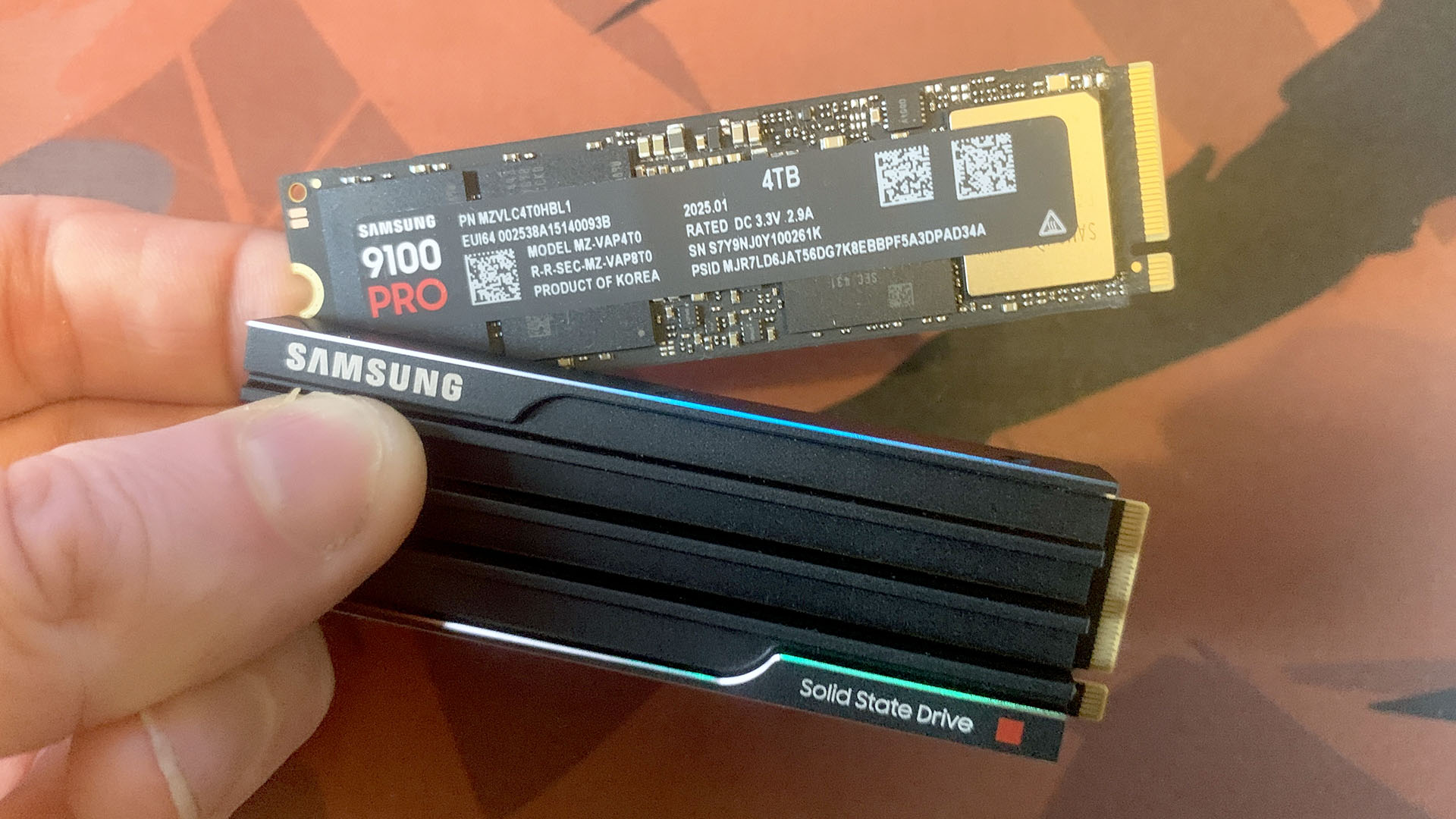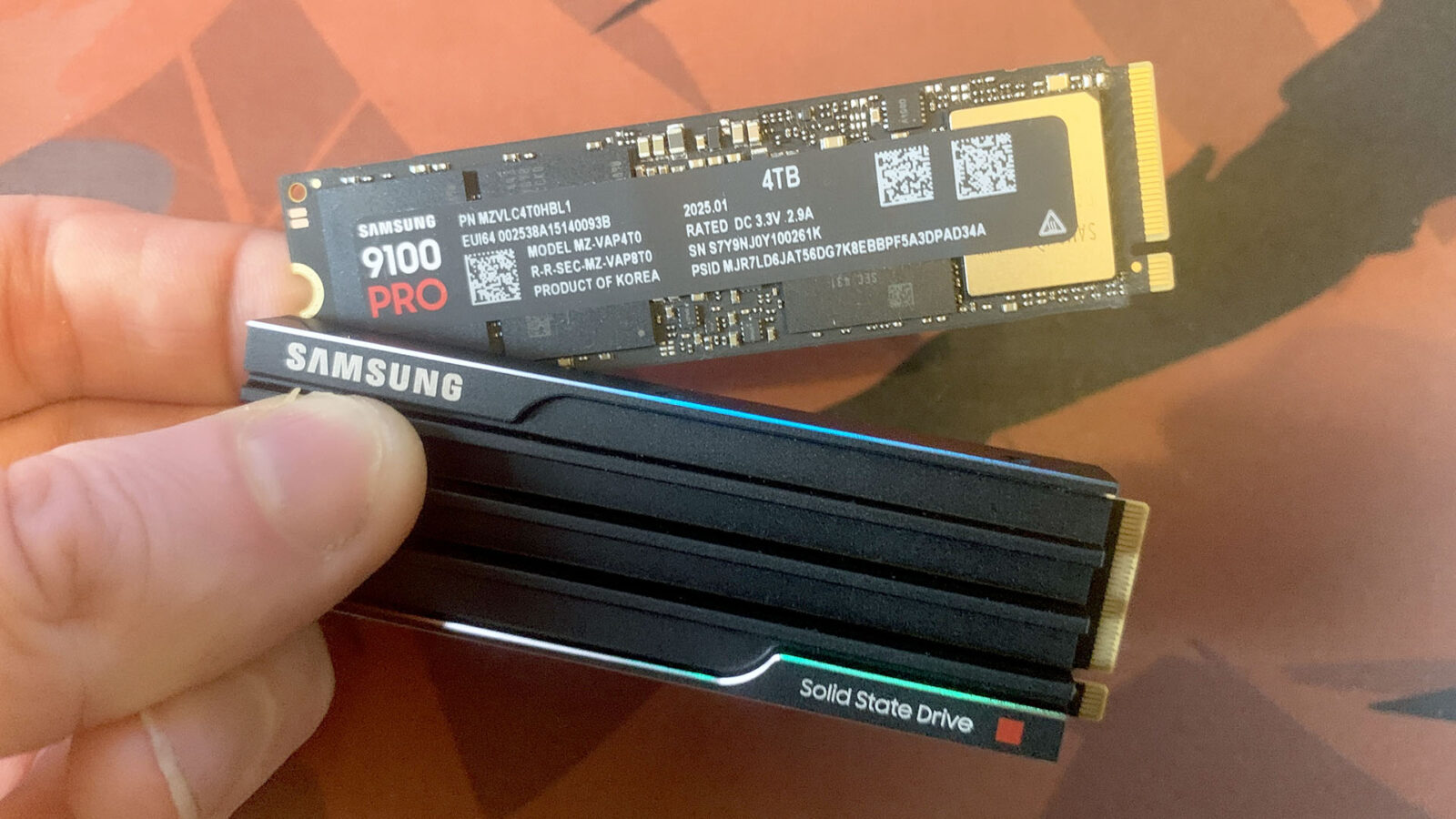
It’s taken a few years, but Samsung has finally signed up to the PCIe 5.0 SSD club, announcing a brand new line of super-fast drives. The company says the new Samsung 9100 Pro is up to 99% quicker than its predecessor, the already-fast 990 Pro, and that it’s even faster than the mighty Crucial T705 and MSI Spatium M580 Frozr.
Samsung also turned up late to the PCIe 4.0 party, but it absolutely ruled the roost in terms of sequential read and write performance, as we found in our Samsung 990 Pro review. It looks as though the company is going for a similar approach with the new 9100 Pro, which comes in capacities ranging from 1TB to 8TB, and boasts a maximum claimed sequential read speed of 14,800MB/s for the 4TB and 8TB drives.
As a point of comparison, the Crucial T705 maxes out at 14,500MB/s, while the PCIe 4.0 990 Pro has a claimed maximum sequential read speed of 7,450MB/s. In our own tests, we found that while the 990 Pro was indeed the fastest PCIe 4.0 drive we’d tested, its top sequential read speed of 7,198MB/s was still below Samsung’s claims.
There’s a small amount of variation between the performance of different capacities of the 9100 Pro, but we’re only talking about a 100MB/s difference in the read and write speed for the 1TB drive, and just on the read speed for the 2TB model. There are also substantial differences between the endurance ratings of the drives, with the 8TB model rated to write up to 4,800TB in its lifetime, compared to just 600TB for the 1TB model.
The new drives will also be available with and without a heatsink, with the latter looking pretty slim for a PCIe 5.0 drive, and measuring just 0.35 inches tall.
Samsung 9100 Pro specs
| Samsung 9100 Pro | |
| Interface | 4x PCIe 5.0 |
| Capacities | 1TB, 2TB, 4TB, 8TB |
| Controller | Samsung in-house |
| Form factor | M.2 2280 |
| Heatsink | Optional |
| Max seq read speed | 14,700MB/s (1TB and 2TB) 14,800MB/s (4TB and 8TB) |
| Max seq write speed | 13,300MB/s (1TB) 13400MB/s (2TB, 4TB, 8TB) |
| NAND | Samsung V NAND TLC (V8) |
| Cache | 1GB LPDDR4X (1TB), 2GB LPDDR4X (2TB), 4GB LPDDR4X (4TB), 8GB LPDDR4X (8TB) |
| Endurance rating (TBW) | 600 (1TB), 1,200 (2TB), 2,400 (4TB), 4,800 (8TB) |
| Warranty | Five years |
Samsung says it’s made some progress on thermals, though, thanks to the low power draw of its new in-house 5nm controller, with the drive apparently being 49% more power-efficient than its predecessor, the 990 Pro. The company describes the heatsink-equipped 9100 Pro as a “cooler, longer-lasting drive,” and we’ll be interested to see how hot the drive runs in our own tests.
It’s also fair to say that, certainly in our own tests, the top sequential read and write figures don’t always bear that much relation to real-world performance, unless you’re regularly shifting huge numbers of files between drives on a regular basis. Even so, this is looking like a top-tier drive if Samsung’s claims hold up in testing.
Samsung 9100 Pro price
The Samsung 9100 Pro price is $199.99 / £150.09 for the 1TB model, $299.99 / £223.79 for the 2TB drive, and $549.99 / £406.79 for the 4TB drive, with the heatsink models adding an extra $20 to these prices.
These prices are a little expensive compared to the likes of the Crucial T705, which is now regularly discounted to around $169.99 for the 1TB drive and $164.99 for a 2TB model, but we’re glad to see that the Samsung launch prices aren’t too over the top, and if past Samsung SSD launches are a reliable benchmark, the drives will hopefully be discounted in the future.
Samsung 9100 Pro release window
The Samsung 9100 Pro release window is April 2025 for the 1TB, 2TB, and 4TB drives, with the company saying it expects to launch the 8TB model in the second half of 2025.
In the meantime, check out our guide to the best gaming SSD if you’re looking to grab a storage upgrade right now. You can also follow us on Google News for daily PC hardware news, reviews, and guides, and join our community Discord to keep up with the latest hardware happenings.











Leave a Reply